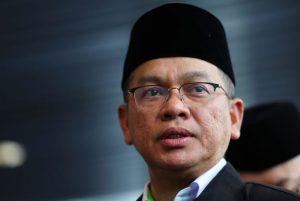The Government is also ready to collaborate with any party to ensure an efficient halal eco-system in the country, said Deputy Prime Minister Tan Sri Muhyiddin Yassin.
“I am happy to note Malaysia has assumed a leading role in introducing standards for halal accreditation and has the expertise to award certification for various non-food products, particularly pharmaceuticals, cosmetics and logistics,” he said.
The halal industry, he added, was booming and there was now greater worldwide acceptance of its standards and certification, including by communities of various religious beliefs.
Muhyiddin said this when opening the 7th World Halal Forum (WHF) here yesterday.
 Eye-catching item: Muhyiddin visiting a batik stall after the opening ceremony of the World Halal Forum 2012 in Kuala Lumpur yesterday. — Bernama
Eye-catching item: Muhyiddin visiting a batik stall after the opening ceremony of the World Halal Forum 2012 in Kuala Lumpur yesterday. — Bernama“It is to be emphasised that halal products and services should be promoted and targeted, not only for the global Muslim community, but also among the greater number of non-Muslim consumers.
“They will readily accept halal products and services that meet global standards and quality as well as conform to prevailing market requirements, including environment and safety standards.
“Opportunities in the halal market are endless, as the concept encompasses the entire value chain of commercial activities,” the deputy prime minister said.
He added that continuous creativity and innovation in products and services were needed to further enhance the industry and brand as well as to spur downstream business activities.
He commended forum host, the International Halal Integrity (IHI) Alliance, for setting standards to ensure halal integrity is maintained throughout an unbroken supply chain “from farm to fork”.
IHI chief executive officer Darhim Dali Hashim said the international trade of halal products had accelerated at a “tremendous pace” with the world’s halal market estimated to be worth some US$2.3 trillion (RM7 trillion).
However, he noted, halal was still an unregulated sector in many places, adding only 10 of the 57 countries of the Organisation of Islamic Conference (OIC) have some form of halal regulation.



